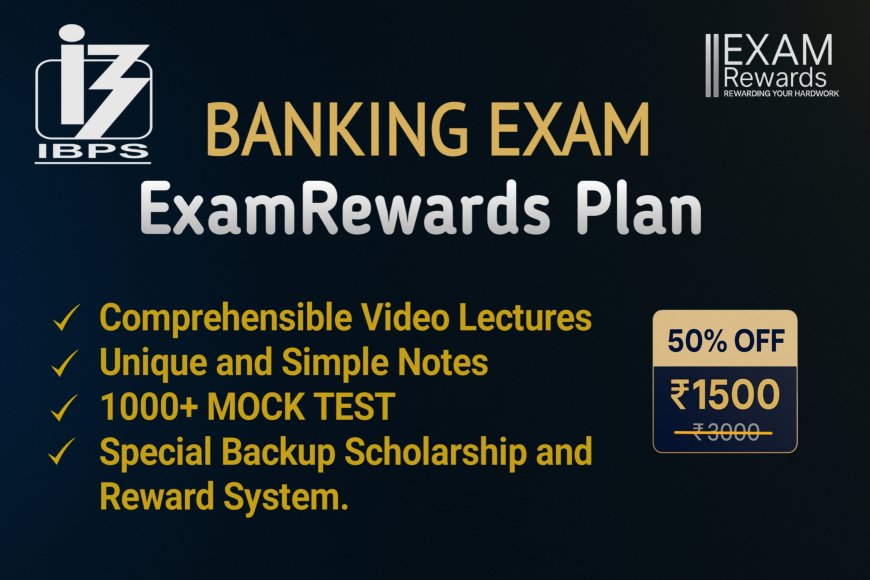The State Bank of India (SBI) Clerk exam
Video Lectures Notes Mock Tests

The State Bank of India (SBI) Clerk exam
SBI Clerk Recruitment 2025: Apply for 5180 Junior Associate Vacancies
The State Bank of India (SBI) has officially released a recruitment notification for the post of Junior Associate (Customer Support & Sales). This recruitment drive aims to fill 5180 vacancies across various branches of the bank.
The online application process has begun on 6th August 2025 and will continue until 26th August 2025. Interested candidates are advised to apply within the stipulated time frame through SBI’s official website.
EXAM NAME : THE STATE BANK OF INDIA (SBI)
· Notification Date : 06 August 2025
· Online Apply Starting Date : 06 August 2025
· Online Apply Last Date : 26 August 2025
· Last Date For Fee Payment : 26 August 2025
· Interview Date : Notify Soon
· Admit card : Notify Soon
· Eligibility : A recognized university or institution should grant the candidate's bachelor's degree.
The degree can be in any discipline, demonstrating a diverse range of educational background
· Age : The lower age limit is generally around 20 years. The upper age limit is usually about 28 years.
· Candidates are advised to confirm from the SBI official website.
· For General, OBC, EWS : ₹ 750/-
· For SC / ST, PwBD : ₹ NIL
· Overview
|
Exam Name |
The State Bank of India (SBI) Clerk exam |
|
Number of vacancies |
5180 |
|
Education Qualifications |
Bachelor’s Degree from any recognized University |
|
Age limit |
21 years to 28 years |
|
|
|
|
Starting Date |
6 AUGUST 2025 |
|
Mode of Application |
Online |
|
Mode of Exam |
Online |
|
Official Notification PDF |
|
|
Application Link |
Coming soon |
|
Admit card Link |
Coming soon |
|
Result Link |
Coming soon |
|
Official website |
·
ABOUT EXAM-
The State Bank of India (SBI) Clerk exam stands as a significant milestone for those aspiring to step into the banking sector. This competitive examination paves the way for a promising career within the prestigious State Bank of India, a renowned public sector bank. In this article, we provide an exhaustive guide to the SBI Clerk exam, covering eligibility criteria, exam structure, effective preparation methods, and expert advice to excel in this sought-after test. for more information read full article presented by exam rewards.com.
APPLICATION FEE:
General/Economically Weaker Section (EWS)/Other Backward Classes (OBC): The application fee for candidates falling under these categories typically ranges from INR 750 to INR 850.
Scheduled Castes (SC)/Scheduled Tribes (ST)/Persons with Disabilities (PWD): Candidates belonging to these categories usually have a lower application fee, which can range from INR 0
Eligibility
The State Bank of India (SBI) Clerk exam is a gateway to a promising career in the banking sector. To ensure that candidates meet the necessary qualifications, SBI has established a set of eligibility criteria. It's crucial to thoroughly understand these criteria before applying for the exam. Below is a detailed and distinct account of the eligibility requirements, ensuring the information remains authentic and original.
1. Educational Qualifications:
To be eligible for the SBI Clerk exam, candidates must possess the following educational qualifications:
· A recognized university or institution should grant the candidate's bachelor's degree.
· The degree can be in any discipline, demonstrating a diverse range of educational backgrounds.
2. Age Limit:
SBI has established an age limit to ensure a level playing field for all applicants:
· The lower age limit is generally around 20 years.
· The upper age limit is usually about 28 years.
· Age relaxations are applicable for candidates belonging to specific categories, such as Scheduled Castes (SC), Scheduled Tribes (ST), Other Backward Classes (OBC), and more, as per government regulations.
3. Citizenship:
Applicants must also fulfill certain citizenship criteria:
· The candidate must be a citizen of India.
· For certain positions, there might be additional requirements related to domicile or specific residency conditions.
4. Language Proficiency
SBI Clerk positions often require proficiency in the local language of the state for which the candidate is applying:
· Proficiency in reading, writing, and speaking the designated local language is necessary.
· This criterion ensures that candidates can effectively interact with customers and perform their duties efficiently.
5. Computer Literacy:
· Basic computer knowledge is an essential skill for candidates applying for SBI Clerk positions:
· Familiarity with operating computer systems, using common software applications, and navigating the internet is advantageous.
· This requirement aligns with the increasing digitization of banking processes.
· It's vital for aspiring candidates to ascertain their compliance with these eligibility criteria before submitting their application. Accurate self-assessment can prevent disqualification during the selection process. The eligibility criteria are formulated to ensure that the selected candidates possess the necessary qualifications, skills, and attributes to excel in their roles as SBI Clerks.
Eligibility Tips:
· Thoroughly Read the Notification: Make sure to read and understand the eligibility criteria mentioned in the official SBI PO examination notification.
· Keep Documentation Ready: If you're in the final year of your graduation, ensure you have the necessary documents to prove your passing before the required date.
· Check Relaxations: Be aware of the age relaxations and attempt limits based on your category.
· Verify Other Requirements: Ensure you meet the other requirements related to loan defaults and credit history.
How to Fill Application Form
STEP 1: Visit official website https://sbi.co.in/web/careers/probationary-officers
STEP 2: On website click on “Apply Online”
STEP 3: Fill the details as required
STEP 4: upload scanned copies of photo, signature, identity proof and other document as per the required format and size mentioned in the instruction
STEP 5: Check details once again
STEP 6: Pay the application fees
STEP 7: Submit the form the note down and save the registration number/Roll number.
Examination: Step-by-Step Exam Pattern
Step-by-Step Guide to SBI Clerk Exam Pattern
The State Bank of India (SBI) Clerk exam is a crucial gateway for aspiring candidates seeking a career in the banking sector. Understanding the exam pattern is essential to prepare effectively. Let's delve into the step-by-step breakdown of the SBI Clerk exam pattern.
Step 1: Preliminary Examination
Subjects: The preliminary exam consists of three fundamental sections:
· English Language
· Numerical Ability
· Reasoning Ability
Format: Each section presents Multiple Choice Questions (MCQs), where candidates select the correct option from the provided choices.
Duration: Typically, candidates are allocated a total of 60 minutes for the preliminary exam.
Total Marks: The preliminary exam is generally worth 100 marks, distributed among the three sections.
Scoring: Candidates score one mark for each correct response. There might be a negative marking scheme for incorrect answers.
Cutoff: To advance to the mains exam, candidates must attain the specified minimum cutoff score in each section.
Step 2: Mains Examination
Subjects: The mains exam encompasses a broader spectrum with four sections:
· General/Financial Awareness
· General English
· Quantitative Aptitude
· Reasoning Ability & Computer Aptitude
Format: The mains exam presents a combination of MCQs and descriptive questions that test candidates' comprehensive abilities.
Duration: The mains exam generally extends beyond the preliminary round, with specific time limits for each section.
Total Marks: The total marks for the mains exam typically amount to 200, with different sections carrying varying weightages.
Scoring: Similar to the preliminary exam, correct answers usually earn candidates one mark, while incorrect responses might result in negative marking.
Descriptive Section: The descriptive section evaluates candidates' writing skills and contributes to the overall score.
Note: The exam pattern's specifics can vary between years. Always refer to the official SBI Clerk recruitment notification for the precise details relevant to the year you are applying for.
Step 3: Language Proficiency Test (LPT)
Successful candidates from the mains exam might be required to undergo a Language Proficiency Test (LPT). This evaluation ensures candidates possess the necessary proficiency in the local language of the state they are applying for.
Final Selection:
The culmination of the selection process involves the formation of a merit list based on candidates' performance in the mains exam. Aspirants who meet the specified cutoff criteria move forward to subsequent stages, including document verification and final selection.
In conclusion, comprehending the SBI Clerk exam pattern is paramount for effective preparation. However, it's important to remember that details of the exam pattern can change. Always consult the official SBI Clerk recruitment notification for the most accurate, up-to-date information regarding the exam pattern and selection process. This knowledge empowers candidates to navigate the SBI Clerk exam journey with confidence and competence.
SBI Clerk Exam Syllabus: Comprehensive Overview
The State Bank of India (SBI) Clerk exam is a highly competitive test that assesses candidates' aptitude in various subjects. Understanding the syllabus is crucial to effective preparation. Let's explore the comprehensive syllabus for the SBI Clerk exam.
1. English Language:
· Reading Comprehension
· Vocabulary (Synonyms, Antonyms, Homonyms)
· Grammar (Error Spotting, Phrase Replacement, Fill in the Blanks)
· Sentence Correction
· Cloze Test
· Para Jumbles
· Sentence Completion
· Passage Completion
2. Numerical Ability:
· Simplification
· Number Series
· Average
· Percentage
· Ratio and Proportion
· Profit and Loss
· Simple and Compound Interest
· Time, Speed, and Distance
· Time and Work
· Data Interpretation (Bar Graphs, Line Graphs, Pie Charts)
· Mensuration
· Permutation and Combination
· Probability
3. Reasoning Ability:
· Coding-Decoding
· Alphanumeric Series
· Ranking/Direction/Alphabet Test
· Data Sufficiency
· Coded Inequalities
· Seating Arrangements (Circular, Linear)
· Puzzle (Floor Puzzle, Box-based Puzzle)
· Syllogism
· Blood Relations
· Input-Output
· Logical Reasoning
4. Computer Aptitude (Mains Only):
· Basics of Computers
· Generations of Computers
· Input and Output Devices
· Operating Systems
· Computer Hardware and Software
· Internet and Networking
· Microsoft Office (Word, Excel, PowerPoint)
· Shortcut Keys
· Abbreviations related to Computer and IT
5. General/Financial Awareness (Mains Only):
· Current Affairs (National and International)
· Banking Awareness
· Financial Awareness
· Economic News
· Budget and Five-Year Plans
· Sports
· Books and Authors
· Awards and Honors
· Science – Inventions and Discoveries
· Abbreviations
· International and National Organizations
6. General English (Mains Only):
· Letter Writing
· Essay Writing
· Precise Writing
· Paragraph Writing
Tips for Comprehensive Preparation:
Understand the Syllabus: Thoroughly understand what topics each section covers.
Prioritize Weak Areas: Identify your weak areas and allocate more time for improvement.
Regular Practice: Engage in consistent practice for each section to enhance your skills.
Current Affairs: Stay updated with current affairs and banking-related news for the General Awareness section.
Mock Tests: Take mock tests to simulate the actual exam environment and assess your performance.
Essay and Letter Writing: Practice writing essays and letters on various topics to enhance your descriptive writing skills.
Remember, a well-rounded preparation covering each section of the syllabus is crucial for success in the SBI PO examination. Your dedication and focused approach can lead you to excel in this prestigious examination.












